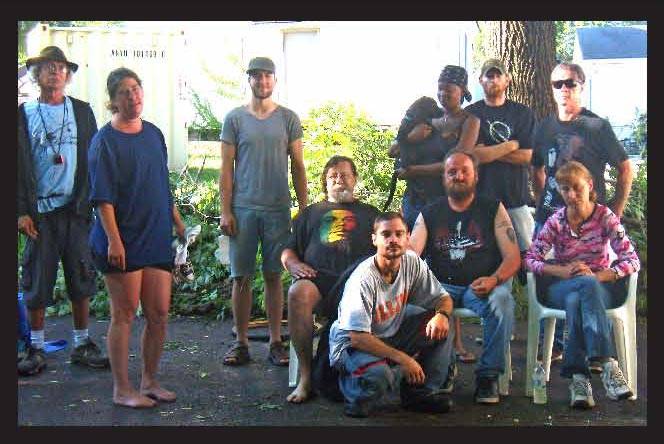
It’s not about the tents. It’s not about zoning ordinances. Safe Haven tent community is about a model of support based on self-governance and belonging.
On Saturday, Safe Haven and the Catholic Worker House held a community building event. They invited their neighbors, city officials, and the media. They wanted people to come and actually see the tents, get to know the residents, and enjoy some food together. And people came. Some came as skeptics, others as supporters. Over a hundred people filtered through the house and the tents.
The purpose of the event reflects the mission of Safe Haven, which is, “to create a safe, clean, self-governed community environment for economically distressed residents of the State of Illinois, through establishment of an open-air place where people living on the streets can have their basic needs met in a stable, sanitary environment…” The residents emphasize self-governance as a key feature of Safe Haven. Johnny Glover, a Safe Haven resident, explains, “Of all the places I’ve been, this is the A-league. Everyone has input. There is not dominant person making all the decisions.”
The whole group meets every Monday and Thursday to discuss what is happening both externally and internally and vote on issues. The residents have also recently elected a Council to deal with violations. Glover was one of the residents elected to the Council, and he describes how they make decisions. “You know you have people with problems, so we deal with them in a humane way. We wait things out instead of taking immediate action. We let people blow off steam. We have all kinds of characters…you have to look at it like that.”
The self-governing nature of Safe Haven has led to a true sense of belonging and support. Rick Stiverson, another resident of Safe Haven, expresses, “This isn’t as structured. Everyone knows everyone and we want to stick together. We are all trying to get better.” Even City Council member William Kyles acknowledged that it is working. “Under its own governance, it seems like it’s run pretty well,” he said.
While Saturday’s event had the spirit of friendship and openness, it also had a sense of urgency. On Thursday, Champaign’s zoning board will hear Safe Haven’s appeal. If the board finds Safe Haven to be in violation of zoning laws, the tent community will be forced to leave the Catholic Worker House. So, Safe Haven is making an appeal. “We are hoping someone comes forward with an offer of somewhere to stay,” Glover requests.
Some offers have already come in. A family in Urbana has offered their backyard. Several churches are also interested hosting the community. But these would only be short-term solutions. “The larger, overall goal of the Safe Haven Tent Community is to become a community service provider and legitimate organization to provide semi-permanent housing for people who have no other place to go,” explains Abby Harmon, a Safe Haven advocate. Towards that end, organizers are proposing that the city allows them to use public land where they can build semi-permanent structures. They are meeting with City Council members to discuss their proposal.
As Safe Haven struggles to find a more permanent location, they are proving that a democratic, self-governed model of support is possible. They are offering a viable alternative to highly structured social service programs. Regardless of whether the tents can stay, the spirit of interdependence should live on.








